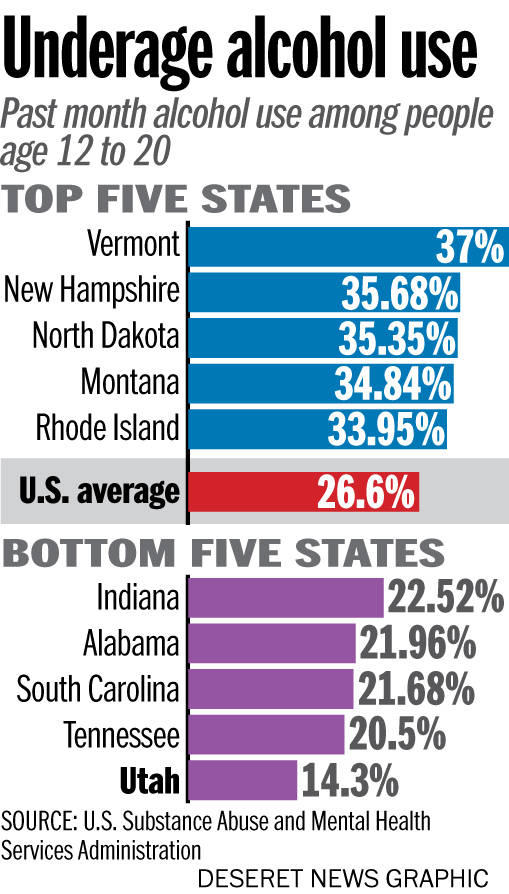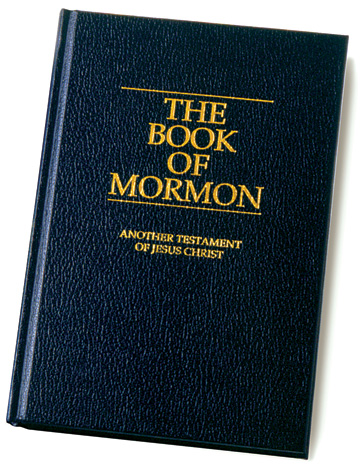A new study from the Federal Alcohol Use report shows that Utah has the lowest number of teens using alcohol. It also has the lowest number of adults who use alcohol, due to the high number of Mormons in the state. Mormon is a nickname for members of The Church of Jesus Christ of Latter-day Saint. Mormons are taught, in a health code called the Word of Wisdom, to avoid alcohol use.
Only 14.3 percent of Utah teens have use alcohol in the past month, compared to 37 percent of teens in Vermont, the state with the highest usage. The states with the lowest teen alcohol use are all states known for high religious membership. The national average is 26.6 percent. In Utah, only 3.23 percent of teens purchased their own alcohol, suggesting most children are obtaining it at home and therefore have parents who drink. At least some have permission from their parents or another adult to use the alcohol. It is important to note that not all Utahans are Mormons, and not all Mormons are practicing.
use are all states known for high religious membership. The national average is 26.6 percent. In Utah, only 3.23 percent of teens purchased their own alcohol, suggesting most children are obtaining it at home and therefore have parents who drink. At least some have permission from their parents or another adult to use the alcohol. It is important to note that not all Utahans are Mormons, and not all Mormons are practicing.
Alcohol use among teens is very dangerous. ParentsEmpowered.org, a Utah organization that works to reduce underage drinking, states that alcohol use in teenagers impacts the intense changes the teen brain is undergoing, leading to long-term and short-term damage. It harms decision making skills, memory, and learning abilities. It also impacts the ability of teens to control impulsive behavior, already a challenge for most teens.
Teens who use alcohol are more likely to become addicted than adults. It increases the likelihood the teens will have social problems, poor academic achievement, and fail to achieve goals.
Alcohol impacts the brains of teenagers differently than it impacts the brains of adults. The teenage drinker may have a hippocampus (the part of the brain that impacts learning and memory) that is ten percent smaller than the hippocampus in non-drinkers and can cause serious brain damage in drinkers ages 21 and younger.
A thirteen-year-old who drinks has a 45 percent chance of addiction. A seventeen-year-old has a 26 percent chance of addiction. A twenty-one year old has just a 7 percent chance of addiction, demonstrating that the earlier you drink, the greater your chance of becoming an alcoholic.
Studies have shown that parental disapproval of alcohol is the primary reason most teenagers choose not to drink. The closeness of the family relationship, clear parental guidelines, and involved parents are also strong factors.
One reason Mormon teens have specifically been shown to be less likely to drink in other studies is that the parents set an example by avoiding alcohol. They make it a clear moral choice and even preschoolers know they should not drink. They do not receive mixed messages—one aspect of increased likelihood of teen alcohol use—by drinking themselves but telling their children not to.
Mormons also create very strong family life. Because Mormons believe family life is eternal, they work particularly hard at building a strong family. They have a weekly family night and daily family scripture study and prayer. Both parents are taught to be actively involved in their children’s lives and to teach their children their standards—and to set an example by living the life they expect their children to live.
Read the report by ParentsEmpowered on the impact of teen drinking.
Read the Deseret News article on Utah’s low level of teen drinkers.
About Terrie Lynn Bittner
The late Terrie Lynn Bittner—beloved wife, mother, grandmother, and friend—was the author of two homeschooling books and numerous articles, including several that appeared in Latter-day Saint magazines. She became a member of the Church at the age of 17 and began sharing her faith online in 1992.





